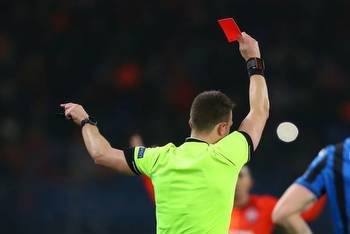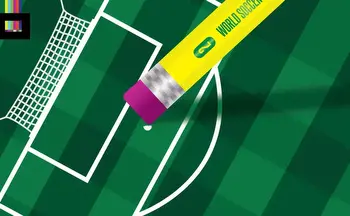Football should consider drastic rule change with refs too quick to show red card with grossly-exaggerated punishments

WHEN your team is a goal behind and the opposition start to use cunning ploys to run down the clock, you will get excitable.
However, when you are one-goal up and under pressure, you will smile along with your mates if your team use clever delaying tactics up to the final whistle.
Unfortunately, Fifa can’t spot a minor blemish on the field of play without taking a bulldozer to it.
So in August, timewasting became a regular yellow-card incident — of which there were no fewer than six in the Women’s Super League last weekend and 11 in the Premier League a week before.
Of course, two yellow cards become a red and an immediate one-match ban.
That was what happened to England defender Alex Greenwood on Sunday.
She took a couple of seconds too long in sizing up alternatives with a free-kick, received her second yellow and got sent off.
Greenwood had taken 26 seconds to play the ball after Emily Heaslip awarded Manchester City a free-kick in the 38th minute of their key home WSL game against Chelsea.
She had already passed it as ref Heaslip strode towards her to issue her sanction — and Greenwood’s delivery was below last season’s average 34 seconds.
Would VAR have saved her?
Even if they were allowed to review second bookings, judging by recent instances, guardians of the monitors in Stockley Park might have been nodding off at the time.
In all, Heaslip showed 11 yellows and two reds in this ONE game, which smacks of being a little over-zealous.
But I wasn’t there and, like most people, I feel referees have a highly challenging job and strong criticism is often unjust.
FIFA see them as policemen with whistles — the sustainers of law and order.
FREE BETS - BEST BETTING OFFERS AND BONUSES NEW CUSTOMERS
True, refs should be decisive but equally they should avoid being pedantic.
As far as I am aware, there was no gain for Greenwood in delaying her free-kick by a few seconds — and she was actually quicker than the normal.
We’ve all seen occasions where players exaggerate minor knocks — and frankly, if they are not wearing shin pads they shouldn’t complain too pitiably.
Every regular fan can point to other annoying examples of time- wasting and that was why the authorities were anxious to use the rules to give them better value for their money.
This has led to numerous 100-minute matches in the men’s and women’s game.
Last week’s Premier League fixture between Fulham and Sheffield United racked up just a few seconds short of 114 minutes.
Fair enough. But the rights of players should be protected and refs should try not to spoil a contest by harsh punishments for trivial delays.
Maybe it is time to consider a sin-bin.
It works in rugby union in the form of a ten-minute penalty for fairly serious offences — which surely nobody would suggest of a four-second delay in taking a throw-in.
Far more infuriating are the delays for falsified injury; while players celebrate scoring by scrummaging with fans in the crowd; the age to bring on substitutes and other time-cheating on a Dr Who scale.
Worst of all are minutes waiting for head-scratching VAR experts, baffled so often by a handball or offside.
My view? Wasted time is a bore.
But the punishment should fit the crime — not grossly exceed it.


































